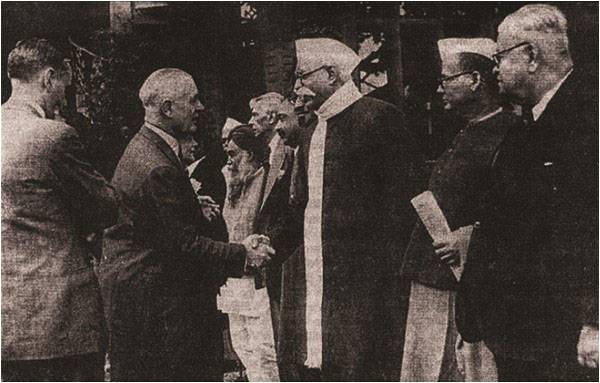
This photograph shows Viceroy Wavell meeting Indian leaders at Simla Conference in 1945.
The conference was a meeting between the viceroy and major political leaders of British India. Convened to agree on and approve the Wavell Plan for Indian self-government, it reached a potential agreement for self-rule of India that provided separate representation for Muslims and reduced majority powers for both communities in their majority regions.
One day before the conference was convened on June 24, Wavell met with Maulana Abul Kalam Azad, Gandhi and Jinnah to assess their approach. He noted in his diary, “Gandhi and Jinnah are behaving like very temperamental prima donnas.” Lord Wavell officially opened the summit on 11:00 am on June 25, 1945. In the beginning, Azad being president of the Congress spoke of its “non-communal” character. Jinnah spoke of Congress’ predominately Hindu character, at that point there was a tug of war that was settled by Wavell’s intervention. On the morning of June 29, the conference was reconvened and Wavell asked parties to submit list of candidates for his new council. Azad agreed while Jinnah refused to submit a list before consulting Muslim League’s working committee. The conference was adjourned till July 14. Meanwhile, Wavell met Jinnah on July 8 and tried to convince him as he was determined to nominate all Muslim members from Muslim League’s platform as he considered Congress Muslim representatives to be “show boys”. Wavell gave him a letter that was placed in front of Muslim League’s Working Committee on July 9. Jinnah replied after careful consideration of Working Committee, “I regret to inform you that you have failed to give assurance relating to nomination of all Muslim members from Muslim League’s platform so we are not able to submit a list.”
Talks stalled on the issue of selection of Muslim representatives. Seeking to assert itself and its claim to be the sole representative of Indian Muslims, the All-India Muslim League refused to back any plan in which the Indian National Congress, the dominant party in the talks, appointed Muslim representatives. This scuttled the conference, and perhaps the last viable opportunity for a united, independent India. When the Indian National Congress and All India Muslim League reconvened under the Cabinet Mission the next year, the Indian National Congress was far less sympathetic to the Muslim League’s requests despite Jinnah’s approval of the British plan.
On June 14, 1945, Lord Wavell announced a plan for a new Executive Council in which all members except the viceroy and the commander in chief would be Indians. This executive council was to be a temporary measure until a new permanent constitution could be agreed upon and come into force. All portfolios except defense would be held by Indian members.
The conference was a meeting between the viceroy and major political leaders of British India. Convened to agree on and approve the Wavell Plan for Indian self-government, it reached a potential agreement for self-rule of India that provided separate representation for Muslims and reduced majority powers for both communities in their majority regions.
One day before the conference was convened on June 24, Wavell met with Maulana Abul Kalam Azad, Gandhi and Jinnah to assess their approach. He noted in his diary, “Gandhi and Jinnah are behaving like very temperamental prima donnas.” Lord Wavell officially opened the summit on 11:00 am on June 25, 1945. In the beginning, Azad being president of the Congress spoke of its “non-communal” character. Jinnah spoke of Congress’ predominately Hindu character, at that point there was a tug of war that was settled by Wavell’s intervention. On the morning of June 29, the conference was reconvened and Wavell asked parties to submit list of candidates for his new council. Azad agreed while Jinnah refused to submit a list before consulting Muslim League’s working committee. The conference was adjourned till July 14. Meanwhile, Wavell met Jinnah on July 8 and tried to convince him as he was determined to nominate all Muslim members from Muslim League’s platform as he considered Congress Muslim representatives to be “show boys”. Wavell gave him a letter that was placed in front of Muslim League’s Working Committee on July 9. Jinnah replied after careful consideration of Working Committee, “I regret to inform you that you have failed to give assurance relating to nomination of all Muslim members from Muslim League’s platform so we are not able to submit a list.”
Talks stalled on the issue of selection of Muslim representatives. Seeking to assert itself and its claim to be the sole representative of Indian Muslims, the All-India Muslim League refused to back any plan in which the Indian National Congress, the dominant party in the talks, appointed Muslim representatives. This scuttled the conference, and perhaps the last viable opportunity for a united, independent India. When the Indian National Congress and All India Muslim League reconvened under the Cabinet Mission the next year, the Indian National Congress was far less sympathetic to the Muslim League’s requests despite Jinnah’s approval of the British plan.
On June 14, 1945, Lord Wavell announced a plan for a new Executive Council in which all members except the viceroy and the commander in chief would be Indians. This executive council was to be a temporary measure until a new permanent constitution could be agreed upon and come into force. All portfolios except defense would be held by Indian members.

